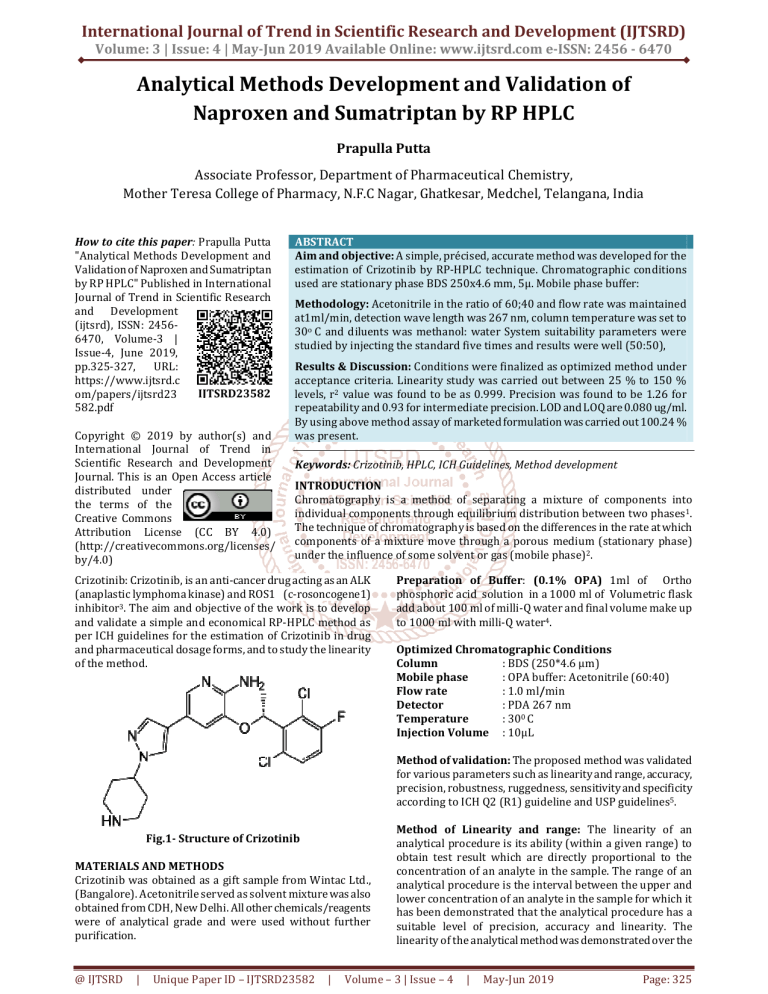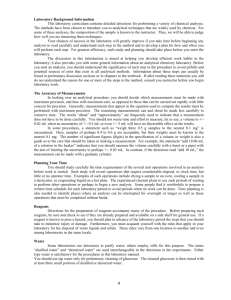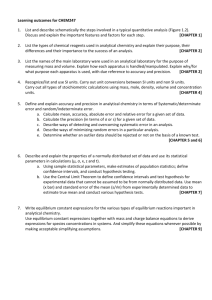
International Journal of Trend in Scientific Research and Development (IJTSRD)
Volume: 3 | Issue: 4 | May-Jun 2019 Available Online: www.ijtsrd.com e-ISSN: 2456 - 6470
Analytical Methods Development and Validation of
Naproxen and Sumatriptan by RP HPLC
Prapulla Putta
Associate Professor, Department of Pharmaceutical Chemistry,
Mother Teresa College of Pharmacy, N.F.C Nagar, Ghatkesar, Medchel, Telangana, India
How to cite this paper: Prapulla Putta
"Analytical Methods Development and
Validation of Naproxen and Sumatriptan
by RP HPLC" Published in International
Journal of Trend in Scientific Research
and Development
(ijtsrd), ISSN: 24566470, Volume-3 |
Issue-4, June 2019,
pp.325-327,
URL:
https://www.ijtsrd.c
IJTSRD23582
om/papers/ijtsrd23
582.pdf
Copyright © 2019 by author(s) and
International Journal of Trend in
Scientific Research and Development
Journal. This is an Open Access article
distributed under
the terms of the
Creative Commons
Attribution License (CC BY 4.0)
(http://creativecommons.org/licenses/
by/4.0)
ABSTRACT
Aim and objective: A simple, précised, accurate method was developed for the
estimation of Crizotinib by RP-HPLC technique. Chromatographic conditions
used are stationary phase BDS 250x4.6 mm, 5µ. Mobile phase buffer:
Methodology: Acetonitrile in the ratio of 60;40 and flow rate was maintained
at1ml/min, detection wave length was 267 nm, column temperature was set to
30o C and diluents was methanol: water System suitability parameters were
studied by injecting the standard five times and results were well (50:50),
Results & Discussion: Conditions were finalized as optimized method under
acceptance criteria. Linearity study was carried out between 25 % to 150 %
levels, r2 value was found to be as 0.999. Precision was found to be 1.26 for
repeatability and 0.93 for intermediate precision. LOD and LOQ are 0.080 ug/ml.
By using above method assay of marketed formulation was carried out 100.24 %
was present.
Keywords: Crizotinib, HPLC, ICH Guidelines, Method development
INTRODUCTION
Chromatography is a method of separating a mixture of components into
individual components through equilibrium distribution between two phases1.
The technique of chromatography is based on the differences in the rate at which
components of a mixture move through a porous medium (stationary phase)
under the influence of some solvent or gas (mobile phase)2.
Crizotinib: Crizotinib, is an anti-cancer drug acting as an ALK
(anaplastic lymphoma kinase) and ROS1 (c-rosoncogene1)
inhibitor3. The aim and objective of the work is to develop
and validate a simple and economical RP-HPLC method as
per ICH guidelines for the estimation of Crizotinib in drug
and pharmaceutical dosage forms, and to study the linearity
of the method.
Preparation of Buffer: (0.1% OPA) 1ml of Ortho
phosphoric acid solution in a 1000 ml of Volumetric flask
add about 100 ml of milli-Q water and final volume make up
to 1000 ml with milli-Q water4.
Optimized Chromatographic Conditions
Column
: BDS (250*4.6 μm)
Mobile phase
: OPA buffer: Acetonitrile (60:40)
Flow rate
: 1.0 ml/min
Detector
: PDA 267 nm
Temperature
: 300 C
Injection Volume : 10µL
Method of validation: The proposed method was validated
for various parameters such as linearity and range, accuracy,
precision, robustness, ruggedness, sensitivity and specificity
according to ICH Q2 (R1) guideline and USP guidelines5.
Fig.1- Structure of Crizotinib
MATERIALS AND METHODS
Crizotinib was obtained as a gift sample from Wintac Ltd.,
(Bangalore). Acetonitrile served as solvent mixture was also
obtained from CDH, New Delhi. All other chemicals/reagents
were of analytical grade and were used without further
purification.
@ IJTSRD
|
Unique Paper ID – IJTSRD23582
|
Method of Linearity and range: The linearity of an
analytical procedure is its ability (within a given range) to
obtain test result which are directly proportional to the
concentration of an analyte in the sample. The range of an
analytical procedure is the interval between the upper and
lower concentration of an analyte in the sample for which it
has been demonstrated that the analytical procedure has a
suitable level of precision, accuracy and linearity. The
linearity of the analytical method was demonstrated over the
Volume – 3 | Issue – 4
|
May-Jun 2019
Page: 325
International Journal of Trend in Scientific Research and Development (IJTSRD) @ www.ijtsrd.com eISSN: 2456-6470
concentration range investigated by triplicate analysis (n =
3) at a concentration range of 2-20 μg/ml. The absorbance
obtained at respective concentration was recorded, and the
graph is plotted as concentration (μg/ml) versus absorbance.
The linear regression equation and the coefficient
correlation were obtained from the UV probe software6.
Method of Accuracy: The accuracy of an analytical
procedure expresses the closeness of agreement between
the value which is accepted either as a conventional true
value or an accepted reference value and the value found.
This is sometimes termed trueness. The accuracy of
proposed method was determined on the basis of recovery
study. Recovery study was carried out by spiking standard
working solution to sample solution (formulation) at three
different levels 80%, 100% and 120%. The final
concentration of Crizotinib was determined at each levels of
the amount; three determinations were performed. The
percentage recovery was calculated as mean ± standard
deviation7.
Method of Precision: The precision of an analytical
procedure expresses the closeness of agreement (degree of
scatter) between a series of measurements obtained from
multiple sampling of the homogeneous sample under the
prescribed conditions. The precision of the method was
demonstrated by intra-day and inter-day variation studies.
In the intra-day precision study, three different solutions of
same concentration were prepared and analysed in the same
day (morning, noon and evening), whereas in the inter-day
precision study, the solutions of same concentration were
prepared and analysed, for three consecutive days, and the
absorbance were recorded. All study was performed in
triplicates. The result was indicated by calculating
percentage RSD8.
Method of Robustness: The robustness of an analytical
procedure is a measure of its capacity remains unaffected by
small, but deliberate variations in method parameters and
provides an indication of its reliability during normal usage9.
Method of Ruggedness: The ruggedness is a degree of
reproducibility of test result under verification of condition
like a different analyst, different instruments and different
days10.
Assay Procedure
Column is equilibrated for 30 min with mobile phase. 20 µl
of diluent as blank was injected into the system and
recorded the chromatogram for a run time of 30 min. 20 µl of
standard preparation-1 was injected into the system and
recorded the chromatogram for a run time of 30 min. 20 µl of
standard preparation-2 was injected into the system and
recorded the chromatogram for a run time of 30 min. Test is
valid only when the match factor is in between 0.98 to 1.02.
20 µl of standard preparation-2 into the system was
separately injected for four times and recorded each
chromatogram for a run time of 30 min. Test is valid only
when the five standard preparation-2 injections pass the
system suitability11.
RESULTS AND DISCUSSIONS
Table1. System suitability - System suitability data
Sl. No
Peak Name
RT
Area
USP Plate Count
1
Crizotinib
2.556 1458811
3949
2
Crizotinib
2.563 1412479
3927
3
Crizotinib
2.565 1450647
3811
4
Crizotinib
2.574 1465621
3719
5
Crizotinib
2.577 1463605
3784
6
Crizotinib
2.617 1444216
3885
Mean
1449230
Standard deviation
19722.4
% RSD
1.4
Method of Precision:
Table2. Data of Repeatability
Sl. No
Peak area
1
1450617
2
1423806
3
1448914
4
1456113
5
1469303
6
1476272
Avg.
1454171
Std. devi
18349.4
% RSD
1.26
Fig.2- blank Chromatogram
Fig.3- System suitability Chromatogram
@ IJTSRD
|
Unique Paper ID - IJTSRD23582
USP Tailing
1.37
1.34
1.33
1.37
1.35
1.33
|
Fig.4- Optimized chromatogram
Volume – 3 | Issue – 4
|
May-Jun 2019
Page: 326
International Journal of Trend in Scientific Research and Development (IJTSRD) @ www.ijtsrd.com eISSN: 2456-6470
Observation: Crizotinib eluted with good peak shape and
retention time and tailing was passed
Intermediate precision: Six working sample solutions of
100 ppm are injected on the next day of the preparation of
samples and the % Amount found was calculated and %RSD
was found to be 0.93 and chromatogram was shown in fig.3.
ACKNOWLEDGEMENT
I am very thankful to Mr. L. Matsyagiri, Associate Professor,
Swami Vivekananda Institute of Pharmaceutical Sciences,
Vangapally, Yadagirigutta, Yadadri Bhongir-506286,
Telangana, India, for his support for the study.
Table3. Data of Intermediate precision
Sl. No
Peak Area
1
1439917
2
1470663
3
1472005
4
1477149
5
1473073
6
1462129
Average
1465823
Standard deviation
13618.0
% RSD
0.93
REFERENCES
[1] Sethi PD., Quantitative analysis of Drugs &
Pharmaceuticals. CBS publishers and distributors, New
Delhi, 3rd edition, 2001 Pg. no 1-120.
[2] Crizotinib.
https://pubchem.ncbi.nlm.nih.gov/compound
(accessed Oct 21, 2015).
Method of Linearity: To demonstrate the linearity of assay
method, inject 5 standard solutions with concentrations of
about 37.5 ppm to 225 ppm of Crizotinib. Plot a graph to
concentration versus peak area. Slope obtained was 21035
Y-Intercept was 892.5 and Correlation Co-efficient was
found to be 0.999 and Linearity plot.
Table4. Linearity Concentration and Response
Linearity Concentration
Sl. No
Area
Level (%)
(ppm)
1
0
0
0
2
25
25
400600
3
50
50
808783
4
75
75
1203917
5
100
100
1624787
6
125
125
2009776
7
150
150
2409818
Table5. Summary of results
Parameters
Crizotinib
Calibration range (mcg/ml)
25-150 ppm
Optimized wave length
267 nm
Retention time
2.563 min
Regression equation (Y)
y = 16091x + 1403.4
2
0.999
Correlation coefficient (r )
Precision (% RSD*)
1.26
Percentage Recovery
100.24
Limit of Detection (µg/ml)
0.080
Limit of Quantization (µg/ml)
0.243
CONCLUSION
Chromatographic conditions used are stationary phase BDS
250 x 4.6 mm, 5µ. Mobile phase buffer: Acetonitrile in the
ratio of 60:40 and flow rate was maintained at 1ml/min,
detection wave length was 267 nm, column temperature was
set to 30o C and diluents was methanol: Water (50:50),
Conditions were finalized as optimized method. System
suitability parameters were studied by injecting the
standard five times and results were well under the
acceptance criteria. Linearity study was carried out between
@ IJTSRD
|
Unique Paper ID - IJTSRD23582
|
25 % to150 % levels, r2 value was found to be as 0.999.
Precision was found to be 1.26 for repeatability and 0.93 for
intermediate precision. LOD and LOQ are 0.080 µg/ml and
0.243 µg/ml respectively. By using above method assay of
marketed formulation was carried out 100.24 % was
present.
[3] Ramachandra and N.V.S. Naidu, Validation of RP -HPLC
Method for Estimation of Dasatinib In Bulk and Its
Pharmaceutical Dosage Forms, International journal of
pharmacy and biological sciences, 2014; 61-68: 22307605.
[4] Kishore konam & Dharmeshwar jadhav, Development
and validation of a RP- HPLC method for determination
of dronedarone in bulk and pharmaceutical
formulation, International Journal of Pharmacy and
Biological Sciences, 2014; 4(1): 179-185.
[5] International Conference on Harmonization (ICH), Q2A.
“Validation of Analytical Procedures: Methodology”.
Geneva, 1994.
[6] Skoog et al., Principles of Instrumental Analysis.
Barkhanath publishers, 8th edition, Pg. no. 973-995.
[7] Prapulla Putta, Analytical methods Development and
Validation of Crizotinib by RP-HPLC Technique,
International Journal of Biochemistry and
Pharmacology, 2019; 1(1); 1-4.
[8] Selvakumar. S, Ravichandran. S, Matsyagiri. L,
Development and Validation of analytical method for
Simultaneous estimation of Ornidazole and Cefixime
trihydrate tablet dosage forms by UV spectroscopy.
Asian J. Pharm. Ana. 2016; 6(4): 246-252.
[9] Chatwal GR, and Anand SK. Instrumental Methods of
Chemical Analysis. 5th Revised and Enlarged ed.,
Himalaya Publication House, Mumbai, 2002; 2: 630.
[10] Matsyagiri. L, Jagadeesh. P, Mounika. B, Srinivas. V,
Theja.V, Madhiha Jabeen and Dr. K. Hemamalini, Effect
of solvents on Spectrophotometric Estimation of
Tinidazole in bulk and dosage forms, World Journal of
Pharmaceutical Research, 2018; 7(9): 1742-1754.
[11] JadhavPB, Vivek Shejwal, Development and Validation
of an RP-HPLC Method for Crizotinib, International
Journal of Pharmacy and Pharmaceutical Research.
Human, 2017; 9(2):100-106.
Volume – 3 | Issue – 4
|
May-Jun 2019
Page: 327





